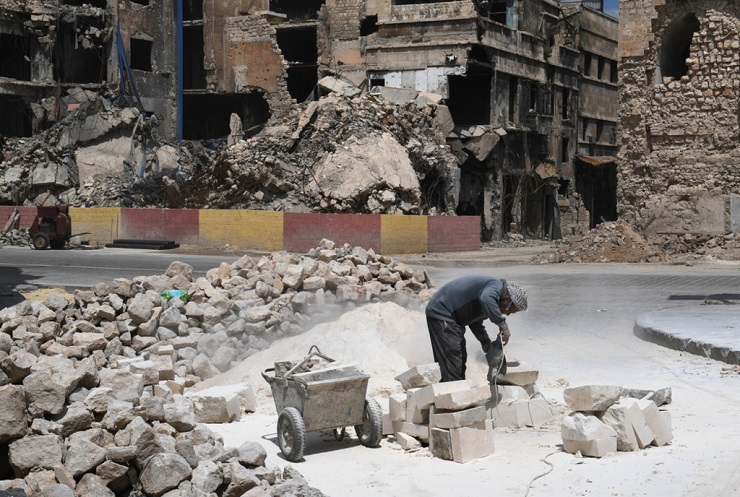Two themes have recently attracted the attention of media and social networks in the Middle East. The first is the trend towards a gradual restoration of Arab relations with the Syrian government.
The second is the role of Russia in the region.
The first is indicated by the resumption of the work of the UAE and Bahrain diplomatic missions in Damascus, the opening of official borders with Jordan, the restoration of air links with a number of capitals, etc.
Since the beginning of the crisis in the Syrian Arab Republic, almost 8 years ago, a number of countries have supplied financial, material and other support for the various opposition groups and intervention attempt in order to overthrow the legitimate power of Damascus. Under pressure from these forces, Syria’s membership in the regional organization – the League of Arab States – was frozen.
And this is despite the fact that Damascus was the initiator and center for decades, bursting with the ideas of pan-Arabism. They were perceived as an instrument for asserting a national community against the challenges of ethno-sectarian disunity by the governments of the states formed in the Middle East.
These ideas have, at various times, served the cause of joint actions to defend the political and economic interests of Arab countries in the region and on the world stage, against the domination of the West, etc.
The events of the crisis in Syria have shown that the intentions of the opponents of Damascus have failed. This is evidenced by the return of government control over its territory and the defeat of terrorist groups, as recognized by prominent Saudi journalist Ahmed Al-Faraj.
At the same time, rocking the boat of the Syrian statehood created a boomerang effect on those who had contributed to it from the outside. Rather than bringing them dividends, it shattered stability, poisoned the atmosphere in the Middle East and increased the fragility of relations between the Arab regimes. The influence of Turkey and Iran has been amplified in the Arab world.
A number of local newspaper headlines sound like a call to speed up Syria’s return to the ranks of the Arabs. “Syria-to Arabs: change and come to Damascus” (Al-Manar), “Rethink the Syrian problem” (Al-Arabiyah).
Analysts point out that after the American invasion of Iraq in 2003, the Arab countries distanced themselves, and as a result, Iran was able to enter and entrench itself in the country. The same mistake is being made now with respect to Syria.
The influential Middle East Online website reproaches the Arabs for always lagging behind in their reaction to the situation and the actions of other players in Syria, and in particular, viewed the Astana Process as giving way to Turkey and Iran.
In Russia, they see a country that has spared no effort, urging Arabs to return to Syria. And over the years, this attitude has not been concealed by Russian Foreign Minister Sergei Lavrov.
Against this background, an increase in attention to the Middle East vector of Moscow’s policy is evident. More and more Arab experts recognize the effectiveness of the Russian Federation, which supported Syria politically and militarily.
The Russian President has focused his efforts on stopping the war in Syria, on consolidating stability, guaranteeing non-repetition of any backlash and external interference.
The victory of the Russian Federation in Syria could be considered strategic. The message is to consolidate it, increasing Russia’s influence in the global balance of forces. Moscow is committed to restraining NATO’s aggressiveness not only in the Middle East, but also in other parts of the world.
The academic circles of the region are also appealing to Russia. This was shown by the forum “The Growing Role of Russia in the Middle East and Its Resonance in the Arab World” recently held at the Center for Middle Eastern Studies in Amman. Its participants discussed the buildup of the role of the Russian Federation in a region experiencing the confusion of crises, the weakness of the Arab League, the failure of the Arab spring in such areas as the establishment of new democratic regimes, etc. As well as acknowledged the importance of the presence of the Russian Federation in the energy sector of the region
In its recommendations, the forum called for a common strategic line for the Arabs in relation to Moscow, taking into account the interests of the Arab countries and crystallization of the realistic view of the role and potential of the Russian Federation.
Last year 2018, in the opinion of the influential website, “was a great year for President of the Russian Federation V. Putin …. The Arabs again showed that they bet on the losing horse (meaning the West). If they had spent what they had done on Russia, they would have acquired much stronger positions in the world, and the fire in the region would have declined.
Yury Zinin, Leading Research Fellow at the Moscow State Institute of International Relations (MGIMO), exclusively for the online magazine “New Eastern Outlook.”

